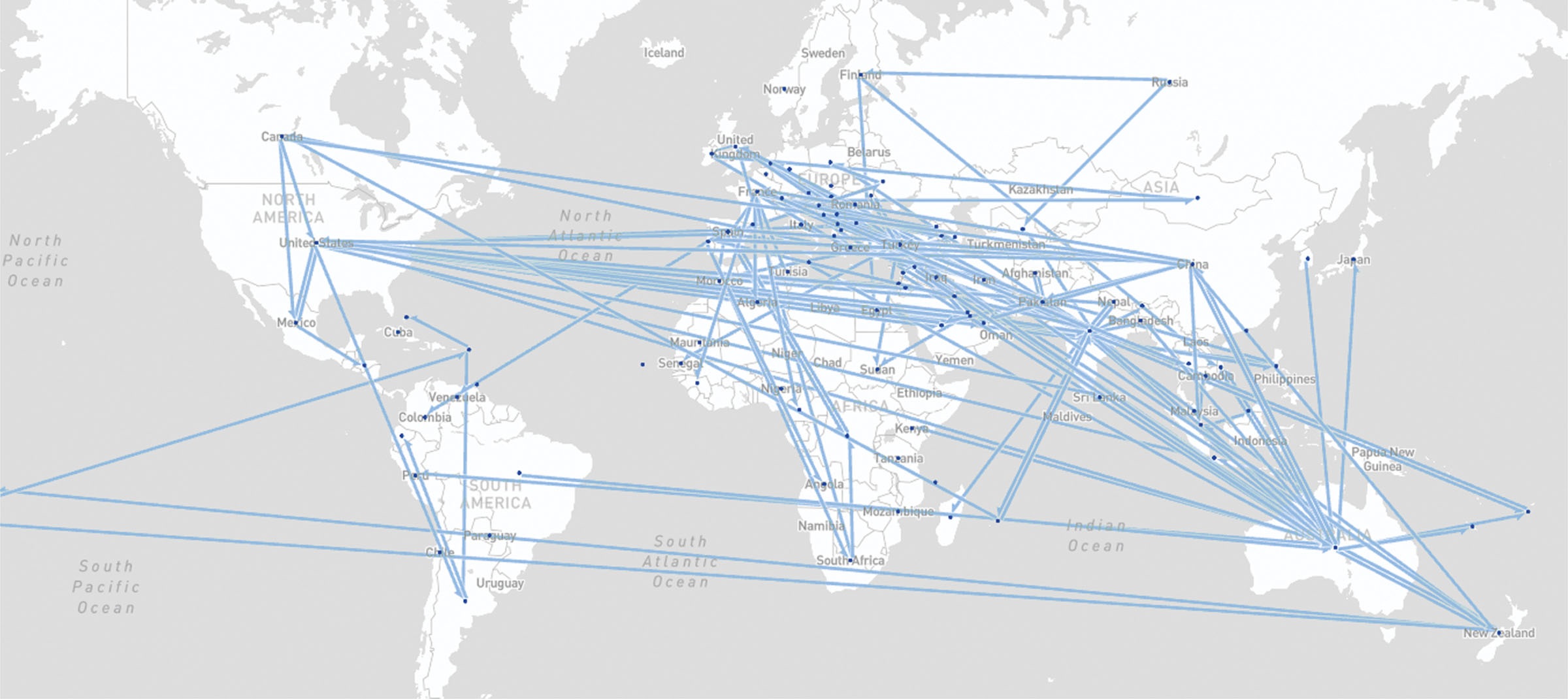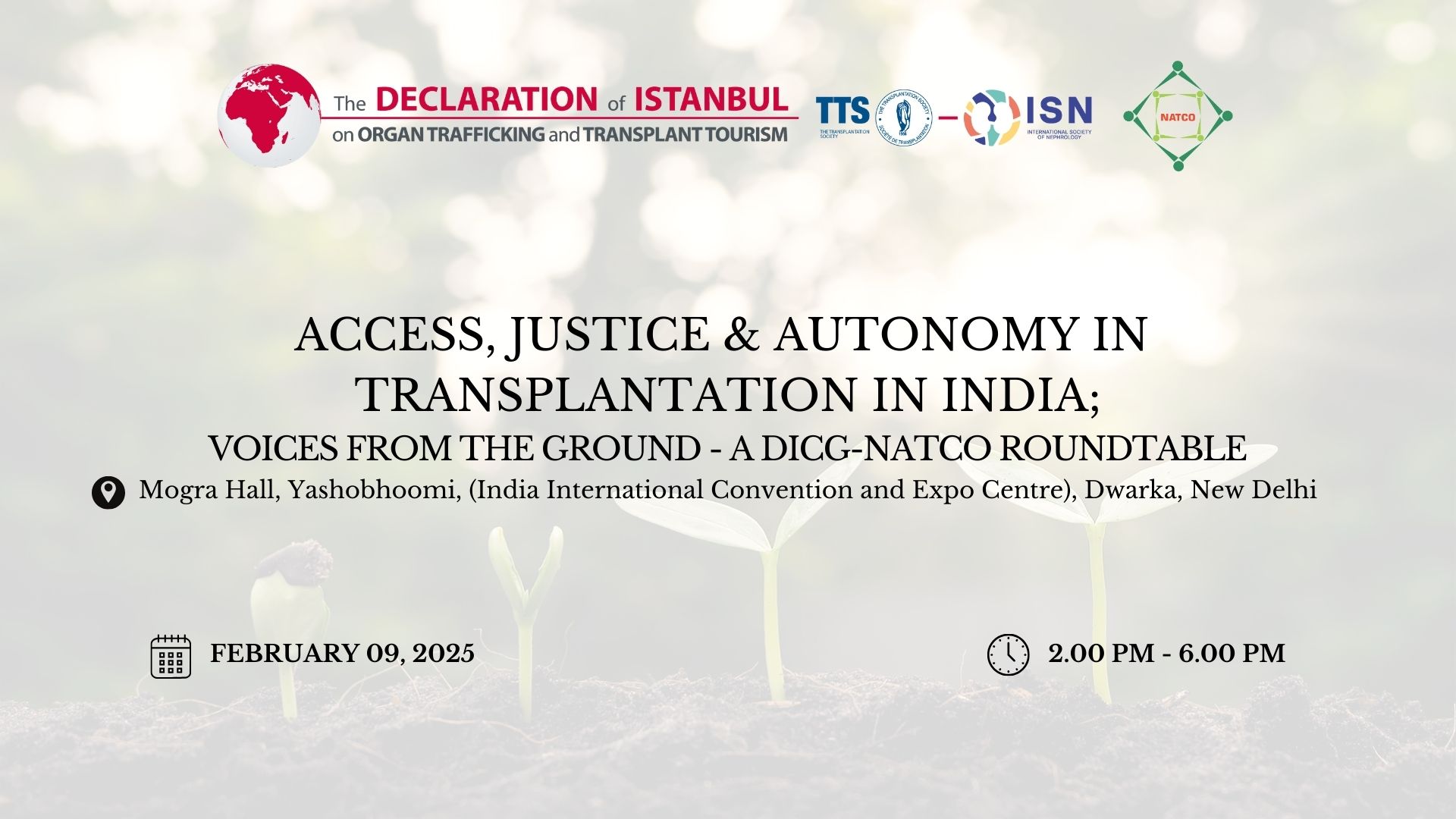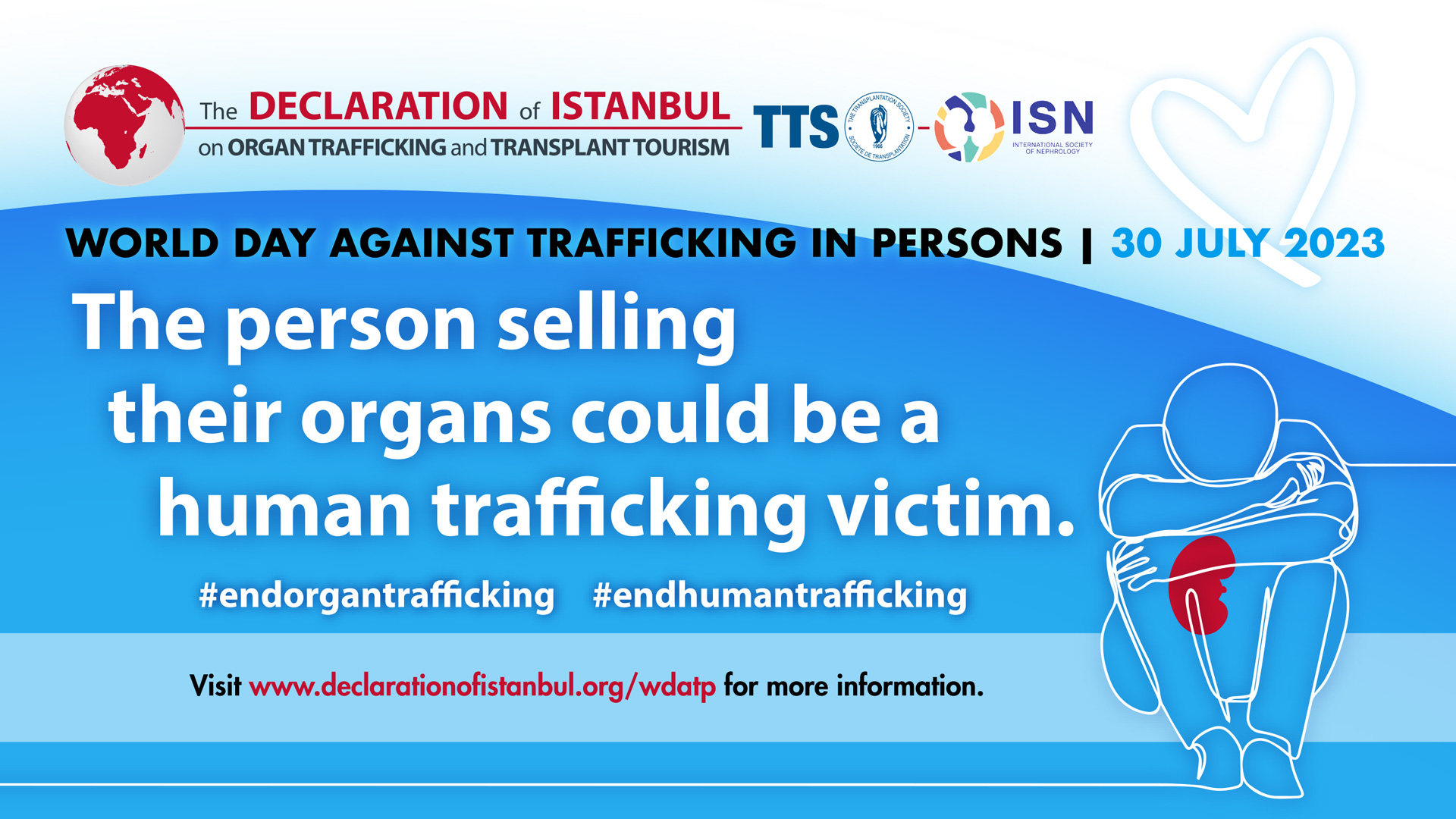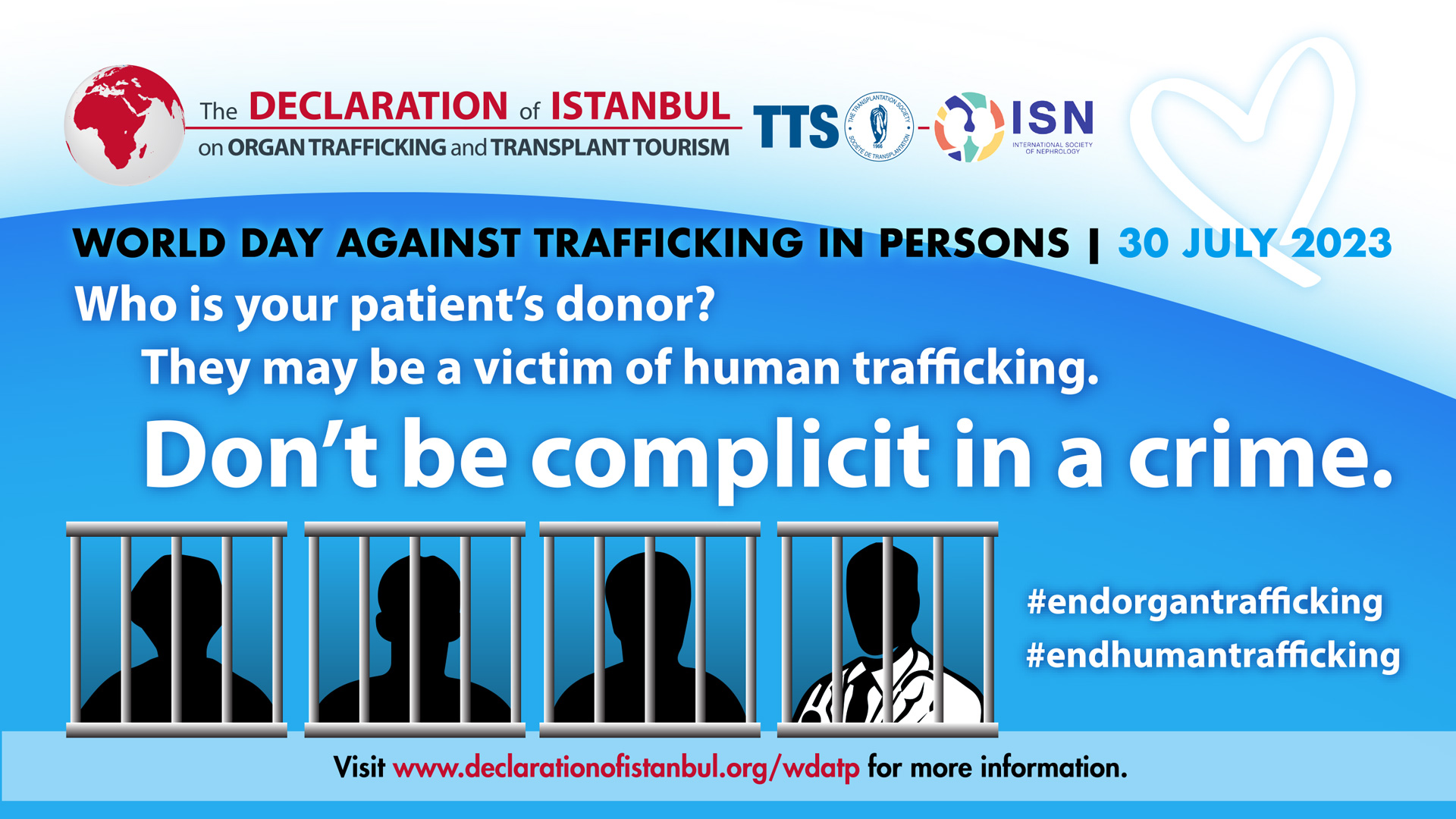Resources
The DICG has created and curated the following resources to educate and inform physicians, patients, professional societies, and others who are interested in organ trafficking and transplanting. To contribute to this page please contact the DICG Executive Officer at This email address is being protected from spambots. You need JavaScript enabled to view it..

Patient Brochure - Thinking about a Kidney?
The Patient Brochure was developed by the Declaration of Istanbul Custodian Group.
It is currently available for download in 18 languages.
You can help support the DICG by translating the brochure into your language (if not already available) and sending your translation to the DICG Executive Officer at This email address is being protected from spambots. You need JavaScript enabled to view it..
Click to see the downloadable patient brochure in all available languages
| Language | Description | Download Link | |
|---|---|---|---|
| العربية (Arabic) | المريض كتيب | تحميل | |
| 病人手册 (Chinese) | 简体中文 | 低分辨率 | 高分辨率 |
| English | Patient Brochure - A4 Size | Download | |
| English | Patient Brochure - Legal Size | Download | |
| Español (Spanish) | Paciente Folleto | baja resolución | alta resolución |
| Français (French) | Patient Brochure | basse résolution | haute résolution |
| עברית (Hebrew) | החולה חוברת | רזולוציה נמוכה | ברזולוציה גבוהה |
| हिन्दी (Hindi) | रोगी पुस्तिका | डाउनलोड | |
| 日本 (Japanese) | 患者のパンフレット | ダウンロード | |
| 한국어 (Korean) | 환자 브로셔 | 지금 다운로드 | |
| Melayu (Malay) | Brosur pesakit | resolusi rendah | |
| Português (Portugese) | Paciente Folheto | baixa resolução | Alta Resolução |
| Punjabi | Patient Brochure | Download | |
| Română (Romanian) | Brosura pacient | rezoluţie mică | de înaltă rezoluţie |
| Русский (Russian) | Брошюра пациента | скачать | |
| Swedish | Patient Brochure | Download | |
| Tagalog | Patient Brochure | Download | |
| Telugu | Patient Brochure | Download | |
| Tamil | Patient Brochure | Download | |
Watch the video version of the patient brochure (available in English only)
The DICG Public Library
The DICG Course On Ethical Issues in Transplantation And The Declaration of Istanbul

Nancy Ascher gives a quick overview of the Declaration of Istanbul. To participate in the full course and to learn more click below
Policy on Meeting Content
Click to View (opens info below)
Policy on Meeting Content for Use by Organizations that Have Endorsed The Declaration of Istanbul on Organ Trafficking and Transplant Tourism
The following recommendations are based on practical experience obtained during the preparation of the academic content of meetings sponsored or supported by The Transplantation Society. These recommendations do not intend to prevent academic examination of controversial issues in organ transplantation. Rather, they aim simply aim to ensure that the organizations that have endorsed the Declaration of Istanbul do not confer academic prestige or professional acceptance on individuals or groups whose actual practices undermine the objectives of the Declaration of Istanbul or involve the use of organs or tissues from executed prisoners. The denial of approval to such individuals and groups seeks particularly to promote ethical and effective organ transplant practices in countries that are struggling to overcome organ trafficking and transplant tourism.
- All abstract submission forms should include a statement to the effect that: "The authors attest that (a) all data (clinical findings, description of clinical material, etc.) were derived from research and clinical activities carried out in accordance with the principles of the Declaration of Istanbul and (b) executed prisoners were not the source of organs or tissues in any of the activities reported."
- Abstract reviewers should be instructed to pay particular attention to submissions from countries designated by the World Health Organization as organ trafficking "hotspots."
- Abstracts that raise concern should be "tagged" and reviewed by the meeting's program planners. The authors of tagged abstracts should be notified of the questions raised concerning their submissions and should be asked to respond to the questions and to confirm that the activities reported were carried out consistently with the Declaration of Istanbul. Should the response received from the authors be unsatisfactory (or absent), the abstract should be rejected.
- The restrictions applicable to authors of abstracts should also be applied to invited speakers. The simplest means of conveying the expectation that such speakers will not present data from activities that are inconsistent with the principles of the Declaration of Istanbul is to ask each speaker to include the statement in Point 1 in his or her acceptance letter. Further, program planners should not invite any person known to have engaged in activities that are inconsistent with the Principles of the Declaration of Istanbul or that rely on organs or tissues from executed prisoners to address the meeting (other than to participate in a discussion of the merits of the Declaration or a comparable issue) unless such person has provided credible assurance that he or she no longer engages in such activities.
Policy documents related to organ trafficking
-
Recent Policy Documents and Publications
- Baseline Ethical Principles and a Framework for Evaluation of Policies: Recommendations From an International Consensus Forum
May 2023 - Covid-19: Publications of unethical donor sources
June 1, 2020 - DICG Statement in Support of the WHO
April 21, 2020 - Strengthening Global Efforts to Combat Organ Trafficking and Transplant Tourism: Implications of the 2018 Edition of the Declaration of Istanbul
March 4, 2019 - European Union National Competent Authorities on Organ Donation and Transplantation Statement on a proposed concept of Global Kidney Exchange
May 27, 2018 - Council of Europe European Committee on Organ Transplantation Statement on the Global Kidney Exchange Concept
April 19, 2018
- Position statement of the Philippine Society of Nephrology on the intent to promote organ donation and transplantation
March 12, 2018
- Baseline Ethical Principles and a Framework for Evaluation of Policies: Recommendations From an International Consensus Forum
-
Older Policy Documents, Legislation, and Publications
- Statement of the Declaration of Istanbul Custodian Group concerning ethical objections to the proposed Global Kidney Exchange Program
29 November 2017 - UN: Strengthening and promoting effective measures and international cooperation on organ donation and transplantation to prevent and combat trafficking in persons for the purpose of organ removal and trafficking in human organs
04 October 2017 - GAEBA Position Statement: Commodification and Profitization of human materials and ocular services
23 August 2017 - Consummation of the Legislative Map of Transplantation in Latin America: Law on Donation and Transplantation Nicaragua -The Last Piece of the Puzzle
26 December 2014
- Qatar Human Organs Transplants Law no. (21) for the year 1997
04 February 2014
- New legislation in Canada which creates extra-territorial jurisdiction for trafficking in persons including for the purpose of organ removal
18 December 2013 - "Trafficking in persons, especially women and children" Note by the Secretary-General (English)
29 October 2013 - "Traite des êtres humains, en particulier des femmes et des enfants" Note du Secrétaire général (French)
29 October 2013 - Detailed account of the provisions of the Doha Donation Accord
29 October 2013 - Costa Rica - Declaration of PROMED against Organ Trafficking
08 June 2013 - American Society for Clinical Investigation - Editorial position on publishing articles on human organ transplantation
24 January 2012 - Europe - administrative commission for the coordination of social security systems
30 August 2012 - France - Anti-Organ Trafficking Law
24 January 2012 - Israel Transplant Law - ORGAN TRANSPLANT ACT, 2008
24 January 2012 - New Zealand - Human Tissue Act 2008
24 January 2012 - New Organ Transplant Policies in Japan, Including the Family-Oriented Priority Donation Clause
29 April 2011 - CST & CSN Policy on Transplant Tourism
02 February 2011 - Remuneration of hematopoietic stem cell donors: principles and perspective of the World Marrow Donor Association
02 February 2011 - The Document of Aguascalientes
02 February 2011 - Who guiding principles on human cell, Tissue and Organ Transplantation
May 6, 2010 - Original Edition of Declaration of Istanbul
15 June 2008
- Statement of the Declaration of Istanbul Custodian Group concerning ethical objections to the proposed Global Kidney Exchange Program
Additional Resources
-
International Travel for Organ Transplantation: A Survey of Professional Experiences and Attitudes Toward Data Collection and Reporting

The study was partially funded by the Declaration of Istanbul Custodian Group, the Transplantation Society and the International Society of Nephrology.
-
Reports and Reviews
-
The End Kidney Deaths Act Risks Irreversible Harm to Organ Donation
March 26, 2025 - Transplantation in the Context of Migration and Refugees: A Summary of the DICG and TTS Ethics Committee Workshop, Buenos Aires, Argentina, September 2022
July 2024 - Organ trafficking — a continuing challenge
February 26, 2024 - In View: People in Transplantation
December 2023 - Protecting Donors and Safeguarding Altruism in the United States. The Living Donor Protection Act
May 28, 2018 - The key role of health professionals in preventing and combating transplant-related crimes
August 3, 2017 - Towards Improving the Transfer of Care of Kidney Transplant Recipients
August 6, 2016 - Organ donation in Israel: Achievements and Challenges
February 20, 2015 - Organ Donation and Transplantation in Central America
March 15, 2015 - Human rights and world culture: The diffusion of legislation against the organ trade
December 09, 2015 - Incentives, kidney donation, and the myth of the Iranian waiting list
December 20, 2015 - The success of South-eastern Europe Health Network (SEEHN) initiative on improvement of the kidney transplant program – facts about Macedonia
February 21, 2014 - The global diffusion of organ transplantation: trends, drivers and policy implications
September 2, 2014 - Towards achieving national self-sufficiency in organ donation in India - A call to action
September 11, 2014 - The declaration of Istanbul in the Philippines: success with foreigners but a continuing challenge for local transplant tourism
February 20, 2013 - Preliminary Marked Increase in the National Organ Donation Rate in Israel Following Implementation of a New Organ Transplantation Law
December 27, 2012
-
The End Kidney Deaths Act Risks Irreversible Harm to Organ Donation
-
The Council of Europe Convention Against Trafficking in Human Organs
The Council of Europe Convention against Trafficking in Human Organs was adopted by the Committee of Ministers of the Council of Europe on 9 July 2014. The adoption of the Convention represents a historical milestone in the fight against organ trafficking. It is the first legal document that provides an internationally agreed upon definition of trafficking in human organs, identifying the activities that ratifying States must criminalize in their national laws.
Like other criminal law instruments, the Convention also includes provisions to deter these practices and to protect victims. This instrument complements the existing international legal framework against trafficking in human beings (including for the purpose of the removal of organs), which does not reach some transplant related crimes and many of the actors, such as surgeons, whose involvement lies at the heart of the criminal activity.
Fourteen countries have already signed the Convention: Albania, Austria, Belgium, Czech Republic, Greece, Italy, Luxembourg, Moldova, Norway, Poland, Portugal, Spain, Turkey and the United Kingdom. This signifies their intention to ratify it, which will bind them legally to incorporate its provisions into their domestic law. The Convention, which was conceived to have a global scope, is open for signature and ratification not only by Council of Europe member or observer countries but by any State in the world, and several have already indicated that they are considering acceding to the Convention, as have additional COE member States.
More information about the Convention can be found in the media and journal articles below.
- Organ Trafficking Convention Opened for Signature (DICG Newsletter Issue #1)
05 May 2015 - Council of Europe publishes conclusions from organ trafficking conference
05 May 2015 - New Treaty Aims to Curb Organ Trafficking
26 October 2014 - Spain to host signing of Council of Europe Convention against Trafficking in Human Organs
02 October 2014 - A Council of Europe Convention to combat trafficking in human organs
10 July 2014 - A needed Convention against trafficking in human organs
28 June 2014
- Organ Trafficking Convention Opened for Signature (DICG Newsletter Issue #1)
Articles Related to Organ Trafficking
Click to view relevant articles
- Organ trafficking — a continuing challenge
- Transplantation in the Context of Migration and Refugees: A Summary of the DICG and TTS Ethics Committee Workshop, Buenos Aires, Argentina, September 2022
- Changing Patterns of Foreigner Transplants in Korea and Overseas Organ Transplants Among Koreans
- Opposition to irresponsible global kidney exchange
- Epistemic Communities, Human Rights, and the Global Diffusion of Legislation against the Organ Trade
- Preventing Trafficking in Organs for Transplantation: An Important Facet of the Fight Against Human Trafficking
- How to address organ trafficking – Point of View of the DICG
- Development of the National Living Donor Assistance Center: reducing financial disincentives to living organ donation
- AJT - Organ Transplantation for Nonresidents of the United States: A Policy for Transparency
- New paper highlights difficulties of measuring transplant tourism
- Police have arrested five people in Spain after a wealthy Lebanese man in need of a liver offered up to €40,000 ($55,000) to whoever was willing to undergo an illegal organ transplant
- Impact of legal measures prevent transplant tourism: the interrelated experience of The Philippines and Israel
- The high cost of organ transplant commercialism
- The Doha Donation Accord Aligned With the Declaration of Istanbul: Implementations to Develop Deceased Organ Donation and Combat Commercialism
- Organ donation and organ trafficking: from dangerous anarchy to problematic equilibrium
- Where There Is Smoke There Is Fire: The Iranian System of Paid Donation
- Personal Viewpoint - The Politics of Combating the Organ Trade: Lessons From the Israeli and Pakistani Experience
- New Foundation to support DOI
- Editorial - Global initiatives to tackle organ trafficking and transplant
- PLANNING THE NEXT 5 YEARS OF DOI
- Trafficking in human beings for the purpose of organ removal in the osce region: Analysis and findings
- Organ Trafficking and Transplant Tourism: The Role of Global Professional Ethical Standards-The 2008 Declaration of Istanbul
- COMUNICADO SOBRE EL TURISMO DE TRASPLANTE - Director General del Centro Nacional de Trasplantes
- Impact of legal measures prevent transplant tourism: the interrelated experience of The Philippines and Israel
- The battle for human organs: organ trafficking and transplant tourism in a global context
- AJT - OPTN/SRTR 2011 Annual Data Report - International Data
- Practical global outreach: translating UK clinical experience - P.N. HARDEN and A. KALACHYK
- Prioritizing registered donors in organ allocation: an ethical appraisal of the Israeli organ transplant law
- Gabriel Danovitch's testimony before the House Foreign Affairs Subcommittee on Oversight and Investigations. Washington DC September 12 - 2012
- The experiences of commercial kidney donors: thematic synthesis of qualitative research
- Brain Death Determination in Israel: The First Two Years Experience Following Changes to the Brain Death Law—Opportunities and Challenges
- Transplant Tourism or International Transplant Medicine? A Case for Making the Distinction
- The Declaration of Istanbul—early impact and future potential
- How Deceased Donor Transplantation Is Impacting a Decline in Commercial Transplantation—the Tamil Nadu Experience
- Worldwide variability in deceased organ donation registries
- Current Status of Organ Transplantation in Japan
- The global role of kidney transplantation
- A criminological perspective: why prohibition of organ trade is not effective and how the declaration of istanbul can move forward.
- The Declaration of Istanbul Is Moving Forward by Combating Transplant Commercialism and Trafficking and by Promoting Organ Donation
- 2009 Global Data in Organ Donation and Transplantation: Activities, Laws, and Organization
- Global health regulations should distinguish between medical tourism and transplant tourism - Alireza Bagheri
- Spain-Ministry of Health-ONT - Good practice guidelines in the process of organ donation
- The Ethical Complexities of Online Organ Solicitation via Donor–Patient Websites: Avoiding the “Beauty Contest”
- ‘In India, there is no altruistic kidney giving’
- When the Law Meets Organ Transplantation: The Experience From the United Kingdom
- Organ trafficking increasing - The Korea Times National - Sept 16 - 2011
- Regulation of Organ Transplantation in China
- Ethical challenges in transplant practice in Latin America: the Aguascalientes Document
- Caution: deceased donor organ commercialism!
- April 30, 2011 - Stop organ trade or quit, Dr Rizvi tells government
- Transplantation tourism: high risk for the recipients
- Opportunities to deter transplant tourism exist before referral for transplantation and during the workup and management of transplant candidates
- Uncontrolled organ donation following prehospital cardiac arrest: a potential solution to the shortage of organ donors in the United Kingdom?
- Striving to achieve a national self-sufficiency
- The principles of gift law and the regulation of organ donation
- Global strategies to meet the organ need – the European experience
- The Sum of a Human’s Parts: Global Organ Trafficking in the Twenty-First Century
- Living Donor Kidney Donation in the United States: Quo Vadis?
- From Helsinki to Istanbul: What can the transplant community learn from experience in clinical research?
- Is altruistic-directed living unrelated organ donation a legal fiction?
- Who Cares? A Lesson from Pakistan on the Health of Living Donors
- The doctor–patient relationship in living donor kidney transplantation
- Kidney Vending: The “Trojan Horse” of Organ Transplantation
- Information about organ trafficking, transplant tourism and its consequences
- Protecting Donors and Safeguarding Altruism in the United States. The Living Donor Protection Act
- The key role of health professionals in preventing and combating transplant-related crimes
- Opposition to irresponsible global kidney exchange
- Providing coverage for the unique life‐long health care needs of living kidney donors within the framework of financial neutrality
- Financial Incentives for Living Kidney Donors: Are They Necessary?
- How to address organ trafficking – Point of View of the DICG
- New paper highlights difficulties of measuring transplant tourism
World Day Against Trafficking in Persons
The DICG is happy to participate in the UNDOC's World Day Against Trafficking in Persons campaign. We invite you to share our posters and website.
DICG video library
Recordings From Recent Webinars, Congresses and Online Activities

The Mission of the Declaration of Istanbul Custodian Group (DICG) is to promote, implement and uphold the Declaration of Istanbul so as to combat organ trafficking, transplant tourism and transplant commercialism and to encourage adoption of effective and ethical transplantation practices around the world.



